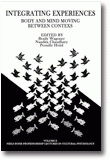
Integrating Experiences
Body and Mind Moving Between Contexts
Edited by:
Brady Wagoner, Aalborg University
Nandita Chaudhary, University of Delhi
Pernille Hviid, University of Copenhagen
A volume in the series: Niels Bohr Professorship Lectures in Cultural Psychology. Editor(s): Brady Wagoner, Aalborg University. Nandita Chaudhary, University of Delhi. Pernille Hviid, University of Copenhagen.
Published 2015
Cultural Psychology studies how persons and social-cultural worlds mutually constitute one another. It is premised on the idea that culture is within us—in every moment in which we live our human lives, in the meaningful worlds we have created ourselves. In this perspective, encounters with others fundamentally transform the way we understand ourselves. With the increase of globalization and multicultural exchanges, cultural psychology becomes the psychological science for the 21st century. No longer can we ignore questions about how our cultural traditions, practices, beliefs, artifacts and other people constitute how we approach, understand, imagine and remember the world. The Niels Bohr Professorship Lectures in Cultural Psychology series aims to highlight and develop new ideas that advance our understanding of these issues.
This second volume in the series features an address by Tania Zittoun and Alex Gillespie, which is followed by commentary chapters and their response to them. In their lecture, Zittoun and Gillespie propose a model of the relation between mind and society, specifically the way in which individuals develop and gain agency through society. They theorise and demonstrate a two-way interaction: bodies moving through society accumulate differentiated experiences, which become integrated at the level of mind, enabling psychological movement between experiences, which in turn mediates how people move through society. The model is illustrated with a longitudinal analysis of diaries written by a woman leading up to and through the Second World War. Commentators further elaborate on the issues of (1) context and history, (2) experience, time and movement, and (3) methodologies for cultural psychology.
CONTENTS
Editors’ Introduction: Cultural Psychology on the Move, Brady Wagoner (Aalborg University, Denmark), Nandita Chaudhary (Lady Erwin University, India), and Pernille Hviid (Copenhagen University, Denmark). PART I: THE NIELS BOHR PROFESSORSHIP LECTURE. Integrating Experiences: Body and Mind Moving Between Contexts, Tania Zittoun (Neuchatel University, Switzerland) and Alex Gillespie (London School of Economics, UK). PART II: THINKING THROUGH CONTEXT AND HISTORY. On Context, Ivana Marková (Stirling University, UK). A Strange Homecomer: “Integrating Experiences” in Alfred Schütz’s Socio-Phenomenological Key, David Carré (Aalborg University, Denmark). Between History and Psychology: Steps Towards Interdisciplinarity, Jacob A. Belzen (University of Amsterdam, Holland). The “Realness” of History: Ambivalence, Social Norms, and the Continuous Movement of Society, Aurora Pfefferkorn and Emily Abbey (Ramapo College, USA). PART III: EXPERIENCE, TIME, AND MOVEMENT. Experiences Which Integrate and Which are Integrated: Proust’s Art of Life and van Gennep’s Rites of Passage as Scenes for “Integrating Experiences” à la Zittoun and Gillespie, Paul Stenner (Open University, UK). Experience as the Effort After Articulation, Antonia Larrain (University Alberto Hurtado, Chile).
Time in and for Development: Mind on the Move Between Multiple and Interdependent Temporal Experiences, Mariann Märtsin (Queenland University of Technology, Australia). Poetic Instants in Daily Life: Towards the Inclusion of Vertical Time in Cultural Psychology, Olga V. Lehmann (Norges Teknisk-naturvitenskapelige universitet, Norway). Moving as Conducting Everyday Life: Experiencing and Imagining for Teleogenetic Collaboration, Niklas A. Chimirri (Roskilde University, Denmark). PART IV: METHODOLOGY IN THE MAKING. The Diary as a Dialogical Space, Michèle Grossen (University of Lausanne, Switzerland). Positioning Ourselves Within Practices and Within the Human Condition, Jack Martin (Simon Fraser University, Canada). Generalization is Possible Only From a Single Case (and From a Single Instance): The Value of a Personal Diary, Jaan Valsiner (Aalborg University, Denmark). "I Am Not THAT KIND OF...": Personal Relating With Social Borders, Jensine Ingerslev Nedergaard, Jaan Valsiner (Aalborg University, Denmark), and Giuseppina Marsico (University of Salerno, Italy). Body, Mind, and Movement: Some Proposals for Constructing a Socially Inclusive Psychology Based on Developmental and Cultural Principles, Tastuya Sato, Hideaki Kasuga, Mami Kanzaki (Ritsumeiken University, Japan) and Brady Wagoner (Aalborg University, Denmark). PART V: REPLY. Social and Psychological Movement: Weaving Individual Experience Into Society, Alex Gillespie (London School of Economics, UK) and Tania Zittoun (Neuchatel University, Switzerland).
-
Paperback978-1-68123-007-8
Web price: $45.04 (Reg. 52.99)
-
Hardcover978-1-68123-008-5
Web price: $80.74 (Reg. 94.99)
- eBook978-1-68123-009-2

- PSY000000 - PSYCHOLOGY: General
- PSY017000 - PSYCHOLOGY: Interpersonal Relations
- PSY031000 - PSYCHOLOGY: Social Psychology
-
 Cultural Psychology and Its Future
Complementarity in a New Key
Cultural Psychology and Its Future
Complementarity in a New Key
-
 Digital Developments
Perspectives in Psychology
Digital Developments
Perspectives in Psychology
-
 Home in Transition
The Cultural Construction of Heimat
Home in Transition
The Cultural Construction of Heimat
-
 Memory in the Wild
Memory in the Wild
-
 The Psychology of Imagination
History, Theory and New Research Horizons
The Psychology of Imagination
History, Theory and New Research Horizons
-
 The Road to Actualized Democracy
A Psychological Exploration
The Road to Actualized Democracy
A Psychological Exploration
-
 Where Culture and Mind Meet
Principles for a Dynamic Cultural Psychology
Where Culture and Mind Meet
Principles for a Dynamic Cultural Psychology

